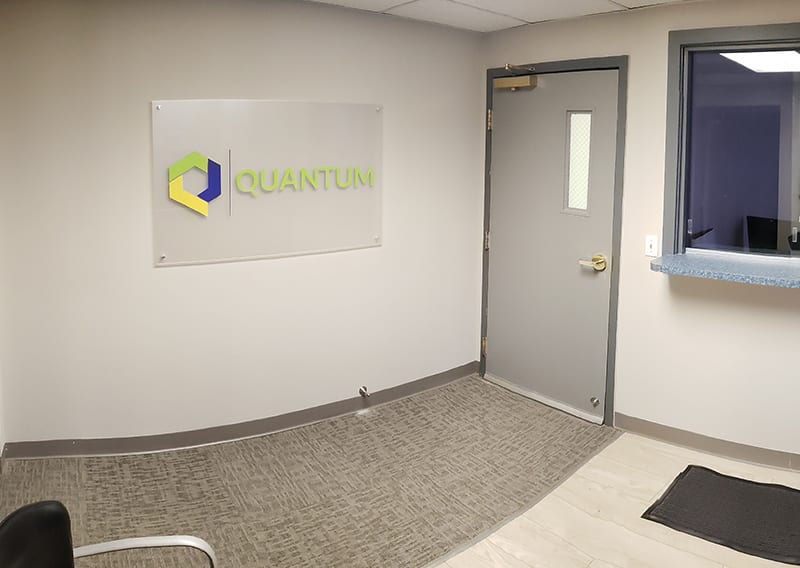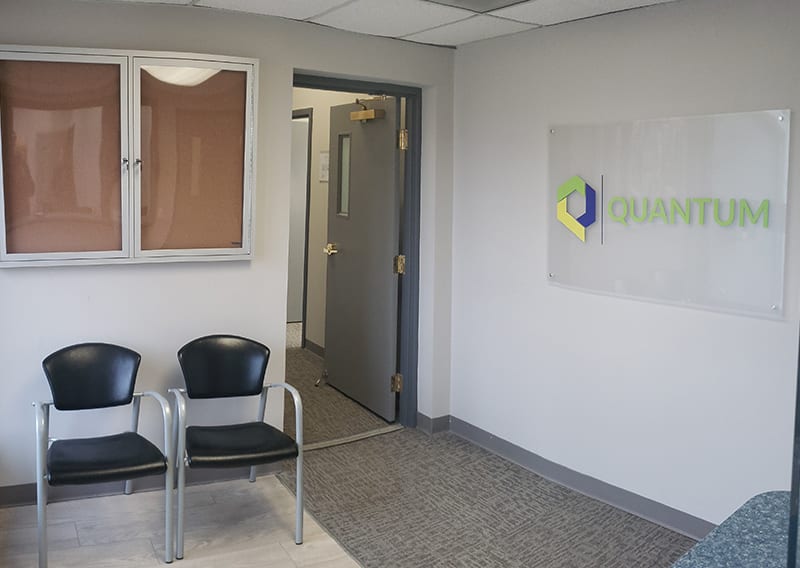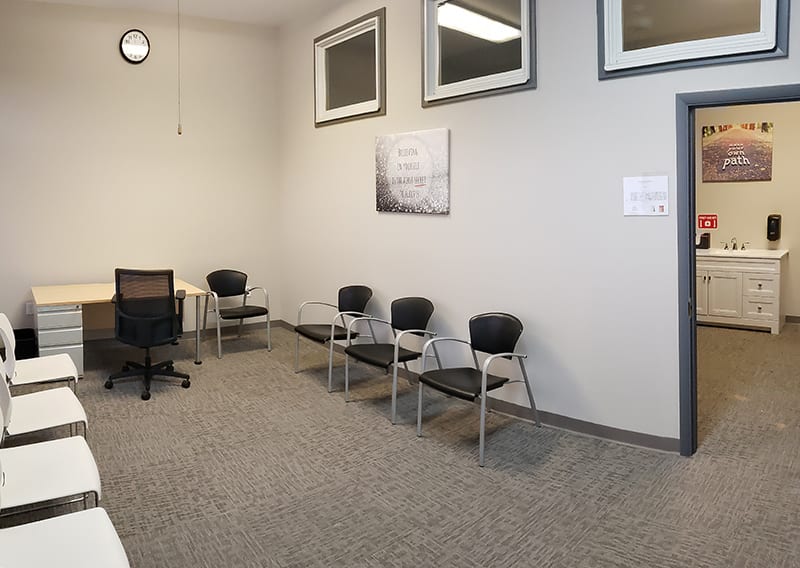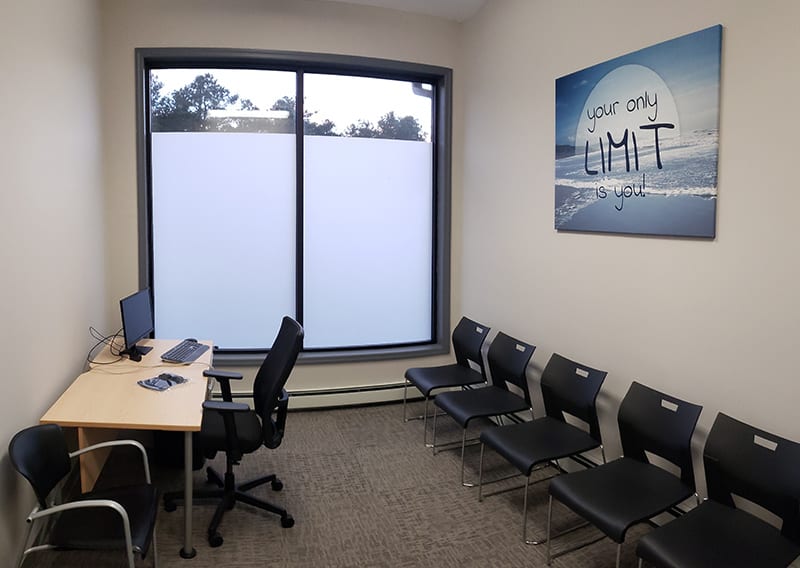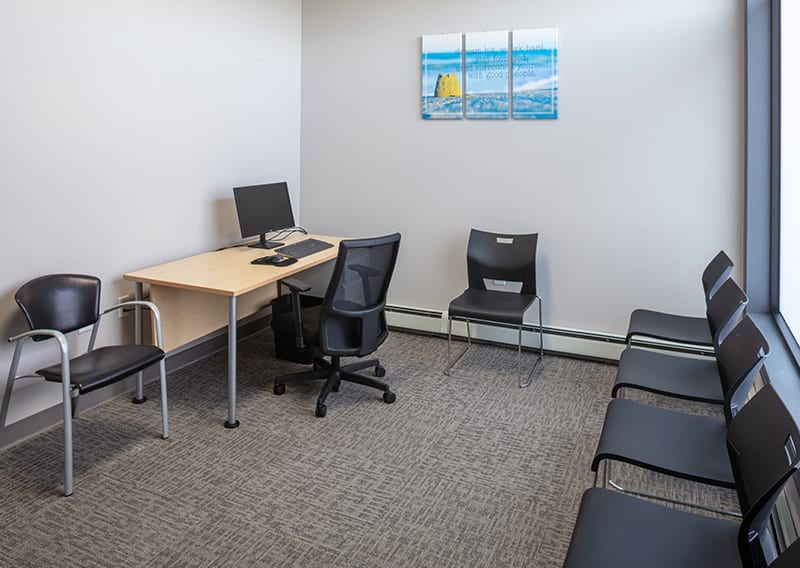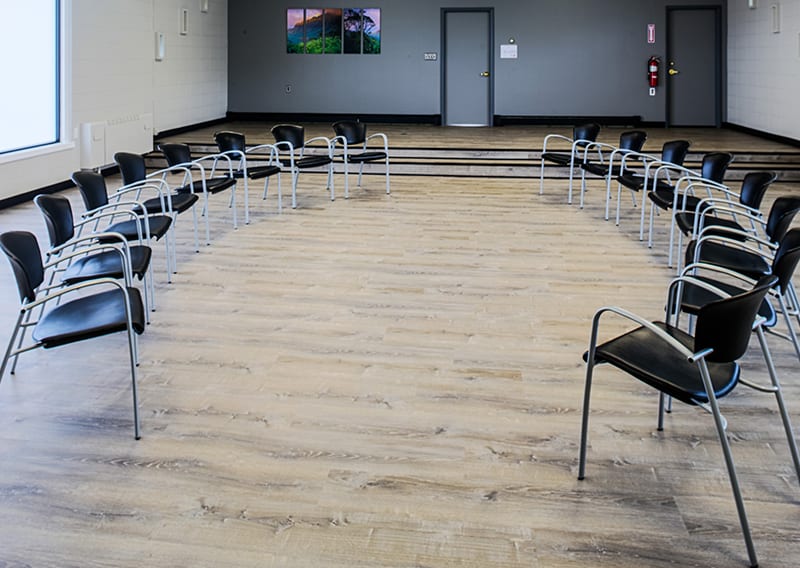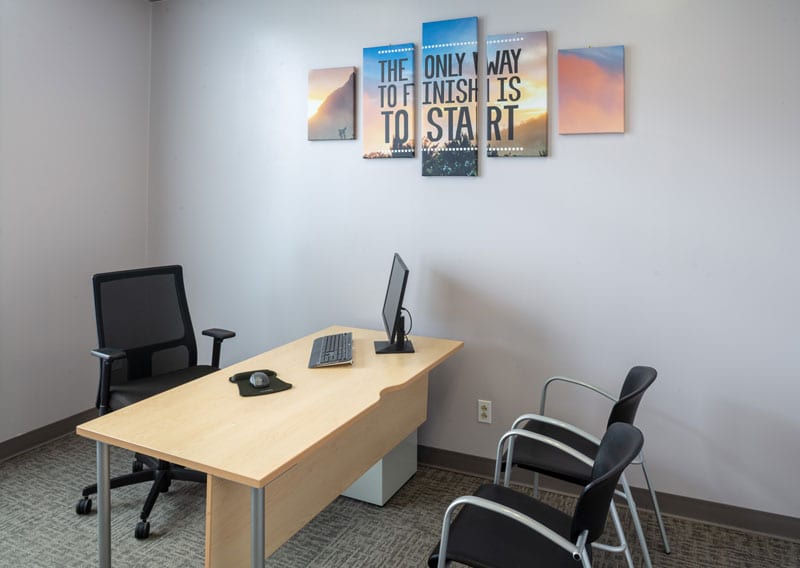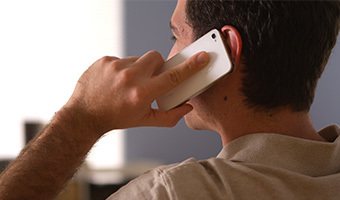Our facility is a warm, inviting, cozy, and secure environment that provides the perfect level of safety, comfort, and privacy as you receive treatment and get on your path to wellness. We’ve designed our space to allow for a low-stress environment where you can focus on your well-being.
Given the concerns of the COVID pandemic, we’re ensuring procedures are followed to create a clean environment for our patients, staff, and visitors. We’ve gone above and beyond CDC and New Jersey State guidance to design our cleaning and disinfecting protocol so that there is no question of the cleanliness and safety of our facility.
You’re here to get well and our priority is maintaining a safe, clean, peaceful, and welcoming environment for you to do just that.
To see our response to Covid-19, click here.
Photo Gallery
Click photos to enlarge
Are You Ready to Begin Your Journey to Recovery?
You could be completely covered. Verify Your Insurance Today.
The Quantum
Process Outpatient Rehab NJ
1. Make the Call
Contact our Quantum Team at
(609) 993 – 0733 to get started.
2. Complete
Your Intake
This streamlined process includes a series of questions and discussion of your unique needs and goals.
3. Get the Best Care Team Possible
After your intake, you’ll meet your Care Team, a group of amazing professionals dedicated to helping you make recovery reality.
4. On-Going Support
After you meet your Care Team, you’ll start to receive treatment based on a Care Plan that’s designed to help you achieve and sustain your recovery.
MAT Addiction Treatment in New Hanover
There are several drugs, both prescription and illicit, that are so addictive, and so devastatingly hard to quit, that cause millions of cases of overdose death and other serious health conditions in the United States each year, resulting in what officials are calling the opioid epidemic, with substance use disorders destroying millions of lives.
Benzodiazepines, alcohol, and opioid use disorders are especially serious, with incredibly difficult withdrawal symptoms that are often not only distressing and painful but can also become life-threatening if you attempt to quit on your own, without medical care and 24-hour monitoring. Depending on the substance, common withdrawal symptoms may include:
- Muscle aches and pain
- Severe distress, anxiety, agitation, and panic attacks
- Depression and suicidal ideation
- Nausea, vomiting and diarrhea
- Shaking
- Restlessness
- Insomnia
- Increased heart rate
- High blood pressure
- Light and sound sensitivity
- Hallucinations
- Seizures
- Delirium tremens
- Strong drug cravings that feel impossible to resist
Managing these symptoms in a safe and effective treatment program involves more than just waiting it out, because these symptoms can suddenly escalate to dangerous levels and may be life-threatening. A full medical treatment plan that takes place within a treatment facility dedicated to safe and effective addiction treatment is necessary for the patient’s overall comfort and safety.
Medical detox is a type of treatment plan that is offered to those in the beginning phase of detox inside a safe and sober recovery center after a full evaluation of the patient’s mental health, physical health, and level of addiction, checking for co-occurring mental illnesses or physical conditions that will need additional treatments.
Detox includes medications provided for pain management, helping with restlessness, discomfort, and avoiding difficult or dangerous health issues like high blood pressure and seizures. Behavioral health treatments, holistic care, and other addiction treatment alongside therapy and counseling may also be provided right away.
Managing any medical complications, discomfort and other issues in detox may help people get through a mild addiction, or an addiction to a substance that does not have long-term physical withdrawal symptoms or recurring symptoms, but for others, a long-term medication-assisted treatment (MAT) is recommended for help with cravings and other symptoms once the detox treatment plans are over.
Addiction is a lifelong brain disease that can be managed but is never cured, and a MAT program can help patients move forward in their life as they become used to using relapse prevention strategies and recovery tools learned in rehab, ensuring cravings and distress do not overwhelm them and result in a relapse, helping them remain abstinent.
What Is MAT?
MAT stands for medication-assisted treatment, a program that begins after a patient’s initial detox program has completed. During detox, you are purging the drugs and alcohol from your system, restoring your brain and body back to their natural states, and getting you prepared to begin your integrated and comprehensive rehab program.
After medical detox, the idea is that having a clear mind and body will help you literally and metaphorically have a fresh start as you enter your individualized rehab program. You cannot quit doing drugs without stopping doing drugs, and a medical detox will help you manage acute intoxication and deal with withdrawal symptoms.
Once this phase is over, usually after three days to two weeks, depending on the level of severity of the addiction, most people will move directly into an inpatient rehab or outpatient rehab in New Hanover where they will begin therapy, learn new life skills, gain relapse prevention strategies and coping tools, and work through the underlying causes of addiction.
For people who have completed their detox program but are continuing to deal with the serious symptoms and cravings that come with alcohol, benzodiazepines, and opioid addiction, further medication and withdrawal treatments are often necessary. This is when a MAT program begins.
MAT programs use FDA-approved medications, along with counseling and behavioral therapy in a whole-patient approach to substance abuse treatment. When used alongside mental health, behavioral health, physical health, spiritual wellness, and educational and social programs, MAT is the most effective way to stop using these highly addictive substances.
The medications given during medication assisted treatment are given in safe prescription doses as to not create a new addiction, and they will help the patient slowly taper down their drug use on a predetermined schedule, (for example a monthly injectable drug schedule or a medication like suboxone or methadone treatment program) so the body does not go into shock or produce dangerous withdrawal symptoms. When given moderated safe doses of these medications, patients will not experience adverse effects on their physical, mental, and intellectual capabilities. The goal of medication assisted treatment (MAT) is to keep the brain chemistry balanced, helping the patient be successful in their recovery programming, taking place in:
- Inpatient rehab centers
- Partial hospitalization (PHP) programs
- Intensive outpatient programs
- Other outpatient programming
There are also medications given to control cravings and block the euphoric effects of these substances, so even if relapse occurs, it will not be pleasurable, breaking the cycle of dopamine production during substance abuse that leads to drug addiction.
What To Expect During MAT?
If you are entering a MAT program for opioid treatment or another of the drug detox and rehab treatment programs for withdrawal management and relapse prevention, your treatment providers will first get to know all about you, your addiction, your history of substance use, and what your goals are for your recovery. Once they learn about your mental health, physical health, and get to know you as a person, they will recommend a plan for you, ensuring you understand every step and agree with the plan before you begin.
Using trauma-informed methodologies is a big part of addiction treatment programs. This means there will be no nasty surprises, and you won’t be forced to do anything you don’t want to do. Going through withdrawal and dealing with addiction is hard enough, so your MAT team will do all they can to make sure you feel safe, listened to, and that all your questions are answered truthfully as you move through your treatment plan.
You will begin medication-assisted treatment right away, so your body and brain can clear, and you can stabilize and grow stronger as you prepare for rehab. Common medications used in MAT treatment include:
- Buprenorphine – an opioid addiction medication used to suppress and reduce cravings
- Naloxone – a medication in opiate treatment that blocks and reverses the effects of opioid drugs like euphoria and pain relief (also used to treat opioid overdose)
- Suboxone – a combination drug of buprenorphine and naloxone for opioid addiction treatment
- Short-acting benzodiazepines like Lorazepam – used to help taper off benzo addictions and as a muscle relaxer and anticonvulsant, also helping with anxiety and restlessness during alcohol detox
- Disulfiram – not a detox drug, this medication is taken once a day and causes very unpleasant feelings if a person drinks even a small amount alcohol (chest pains, difficulty breathing, nausea and vomiting, and headache), creating a negative association with alcohol
- Acamprosate – a medication for alcohol recovery that helps stabilize brain chemicals and reduces the compulsion to drink
- Naltrexone – a medication for alcohol dependency that blocks the “fun” intoxication and euphoria that come with drinking, making it a less desirable substance to use and reducing the risk of relapse
Medication is not the only part of a MAT program. It is an integrated holistic methodology that incorporates mental health care, physical health care, behavioral treatments like cognitive behavioral therapy (CBT), life skills programs, group therapy and individual therapy. Addiction is not solely caused by the action of substance abuse, it is the result of physical dependence, learned and repeated behaviors, social issues, mental health issues and a variety of other circumstances combined. A medically assisted treatment plan aims to heal the underlying causes of addiction while helping the patient move forward in their life, long after they leave the rehab centers behind.
A facility or program that offers MAT treatments will likely have connections to treatment centers that offer residential rehab (inpatient rehab or partial hospitalization programs) or outpatient programs. At Quantum, we have several levels of care on an outpatient level that work well with MAT programs, offering the therapies and treatments you need including relapse prevention programs, peer support programs, and sober living homes after your time in rehab is over, for long-term continued connections to a sober community.
Why Choose Quantum Behavioral Health for Medically Assisted Treatment for Addiction
Quantum Behavioral Health is community partners with detox and inpatient rehab facilities throughout the area, offering several outpatient levels of care that compliment medically assisted treatment programs well, including:
Partial Care (PC):
- 20 hours a week minimum of care
- Mental health, emotional health, and physical health services
- Dual diagnosis care
- Treatment during the day
Intensive Outpatient Program (IOP):
- 9 hours a week minimum of care
- Therapy and support
- Flexible schedule that will work around your life
Outpatient Care (OP)
- Fewer than 9 hours per week of treatments
- Therapy and support
- A more self-directed approach to healing
- Connections to peer groups and 12 step programs like Alcoholics Anonymous
With our highly rated, cost-effective outpatient rehab programs, we help each of our patients on an individual level with treatments and programs like:
- Traditional individual therapy and group therapy
- Meditation and yoga
- Art and music addiction therapies
- Mental health and addiction treatment
- Vivitrol treatments and other evidence-based practices for drug and alcohol rehab
Contact our team today to find out more about treatment for substance use disorders and medically assisted treatment plans today. No matter what drug you are addicted to or how long you have been using it, there is hope, and we can help you take control back over your life.

